you have the vote, but not the rest..
We have the vote, but not the rest, was the comment from a Turkish writer on the quality of democracy there. The rest. Freedom of speech, freedom of belief, equality for the law, independence of the justice system. All givens in the Netherlands. How can our democracy still feel incomplete?
What is a FAIR city we asked our fellow FAIRcity enthusiasts on the public meeting yesterday evening. A lot of topics came to the floor. Form benches in the street to more complicated subjects like liberties political parties take when having the vote. what was interesting that topics like benches are easy to discuss, governance much less so. 'The vote and the rest' is strongly engrained in our minds as the maximum of influence and freedom we are entitled to. It is hard to demand more without feeling silly or radical.
But is 'the vote and the rest' enough? Is it really the summit of mount democracy? One visitor commented on the discrepancy between 'the vote' and 'the euro'. Money talks in Amsterdam and businesses are given much more influence than just a vote. It also happens under the radar. Decisions made on behalves of 'the economy' are hardly ever a political issue. They are neutrally called plans and are the result of private negotiations. Are presented as successes for Amsterdam economy, thus inherently good.
You feel it too? It is hard to even read that economic decisions should be under public scrutiny. In away it feels even unnatural. That's how confused we are. Because of course the FAIRness of a city starts with right of her citizens to participate in its making. Not only by a token vote on parties without any members that represent only a few percent of the population. That's close to fraud.
Noticed it again? Also disagreeing with the participative democracy makes you shift in your chair. What is the alternative? It appears to be too complicated, too big a task to change the whole system of how we are run. Suggested other solutions like direct democracy as practiced by the occupy movement seem silly and laborious at least. You also wouldn't want hard core socialism. So what else?
This is exactly the task at hand. Thinking up alternatives. Discussing if 'the vote the rest' covers real democracy. But the most important thing: taking the first step. Getting used to the idea of that an alternative is possible. And you are entitled to practice it. Not for you. For democracy.
good together is ....?
Being good as a society. Not as an individual. Not as a group. But as a nation. How do you do that? What is that about?
We, the Dutch are.. Thrifty, open, tolerant, rude, traders. That's a very common summing up. We leave out rich, quite indifferent to the outside world, selfrighteous and sloppy. We probably won't mention our kolonial past, which was the basis of us being now so well off. And our cynical track record of weapon trader. And our recent policy of trade for help.
The things we say about 'us' are personal traits. What you would get when you would come accross a Dutch person. The mores of communication. We hardly everr imply actual deeds we have undertaken as a political entity. How we operate when we communicate as a nation with other nations.
When we look for an ethical code for the collective it struggles to find the right angle. SHould we be good in interhuman relations, just as in law abiding, or business like correct. It is hard because the collective is something you cannot experience directly. It is a construct in itself.
The closest we come to experiencing the collective is in the family. Nationalism translates the family feeling to the scale of a people. With the same sentiments. Love, self sacrifice. Feuds. It explains the strong emotions why they defend their nation against 'strange blood'. There is simply no possiblity that a refugee can be part of our family. They are already familymembers of a rivaling people.
Socialists do a little better acception wise by not using blood but moral code as a basis for belonging. In moderation though. The rabiate version has resulted in genocide. THe business approach is open en maybe less perilous on a daily basis. It has led to suffering, inequality and planet scale pollution. It appears when it comes to 'we and good' there still has to be found a perspective that has more potential.
Maybe we should keep it more simple. When dealing with good and society the word Fair comes to mind. At least you should be fair. What is fair? It is a feeling. It is hinting to something balanced. An acceptable difference. Fair is somthing you recognise. but can not define. Therefore it is both useless and brilliant. The thing it presupposes is a proces of communication. Fair is found, not dictated. Interesting...
your ethics mixed or pure?
Huddled up close to the wood stove we had the most interesting conversation. It was about ethics. Wouldn't it be better to not only think and talk about things but have hands on experience with the reality of the problem too? For example, waste. Of course you are against it, who isn't. Zero waist, circular economy, everybody is in favor. But by making it concrete and having to carry around the whole day the waist you produce you start to realize the size of the problem. It was an example given by Marijn of the Bildung Academie. An attempt of students and teachers of the UVA, university of Amsterdam, to broaden the horizon on what is the right way to know.
We automatically assume thinking, writing and to a lesser extent talking is the way knowledge is created when it comes to science. The more we know about how we function as humans the more we know that is only part of the process. Learning and discovering stuff is not so clear cut. Also reproduction of knowledge isn't like reproducing the sentences from the book you read. Understanding, getting it, is a complex neurobiological process that uses all kind of experiences to make new networks. So the concept of the Bildung Akademie seems to make at lest as much sense as restricting knowing to just reading and reproducing text.
Our difficulty with understanding our understanding also shows in other radical divides we make in field of expertise. For example, economy is connected to every aspect of live. Still we allow to economic decision being taken on economical terms. You want to make a profit, fine. Just do the maths. Never mind what the product you produce or buy costs society in long term environmental or health damages, too complicated. Just do it short term. In numbers. We do not take into account the suffering of animals when using plastic. Too complicated. There is no number for pain.
We served tea and cookies with the talking. It never came to mind to charge for them. It would have been quite disturbing to present Marijn and Ilona with a bill. Unkind and in bad taste. Asking for monetary exchange was out of the question. As well we didn't demand other things, like, written proof of everything they said. We didn't lay done the house rules and demanded their pledge no to break them or have violence used against them. We did however try to be good hosts and guests and get to know each other. To build trust.
Having different ethics for different activities is as normal as it is confusing. We do it all day every day. Being able to stick to the rules is equivalent of being a good person or professional. Mixing ethics is punishable by law. Yet, all world problems are testament to the limitations of this approach. It works, but only on the smaller scale. Globalisaton has shown us the limits of the compartmental thinking.
The attempt of the Bildung Academie to somehow to take into account field of knowledge other than the strictly scholarly is attempt to investigate the possibility a more integral ethic. It is exciting. It is a way an attempt to jump over our shadow and become a new species. It'll take time.
Until we are there the question remains: should we be mixing our ethics or keep them pure. Charge for tea and friendship and use love as payment for goods. Just to loosen up a bit. Or stick to what we know but become serial purists: For something to be acceptable it has to be good profitable and true.....
no slogans but....
If debating is a blood sport rather than a means to find truth, that leaves us with a problem. How to get to the right thing to do? Cities are now ruled through representative democracy, supported by a body of civil servants. The moment you choose your representative after a short campaign, dominated by national topics. The realities of the everyday politics are then left to the professionals: civil servants and experts. Debate, as in talking about principles, never comes back to the table again.
It would be fair to say that finding truth or discussing principles and politics are distant cousins at best. City politics is about governance, not philosophy. In a way this is the end of the polis as a human philosophical project. The citizens are no longer party members. People don't define themselves anymore in party political terms. Being a socialist is a statement rather then a definition of to what social strata you belong. We are consumers of society and complain about services not rendered.
Have we lost the ability to accept the limitations of a political stance? Are we no longer capable to accept the consequences of being a socialist? Or is the concept of representational democracy hollowed out. As an inevitable consequence of every representation it has a power on its own, rather then a tool.
It leaves us with the question what next? How to get back either a concept for citizenship more meaning full than client. Or find a way to circumvent the trap of representation. The practise that is promoted as a solution is 'bottom up' governance. What that means however is unclear. the examples that are given by the professionals are more about grass roots information of civil servants than shifting actual power. Or leaving maintenance task to neighborhood based organizations. Again, a shift of responsibility, not power.
What we are looking for is a new idealism, fitted to the contemporary lifestyle and power structures. A globalist proof, network based, non selfish practice. The citizen of now is different from the worker or entrepreneur from more than a century ago. The basic principles in the societal concepts like socialism, equality, justice, kindness, are still valid. Structures in society have changed so much that the strategies how to get there simply won't fly. We want it, but how to get there?
How to create and discuss these much needed new ways for old principles? Do we have the words or the insights to phrase a new blueprint to contemporary global society? Do we even have a platform for these exchanges of views?
The future will happen anyway. To have at least a grasp on how you could influence it for the better is a daunting but inevitable responsibility. Maybe the new initiative FAIRcity is exactly that. A first step to formulate the agenda for change.
how to yes
There's a strategy for being critical in a nice way. Compliments first, a bit of bite later. The sweet to swallow the bitter. Is there also a way to elegantly change your mind? Somehow all tips and tricks are about changing another persons mind. Its never about having your mind changed.
How does admitting you're wrong work? Or is this all ready the wrong way of going about it. You're not wrong, you've just found a righter right. Good for you. Although this is not how it works. You are convincing someone, winning the debate. Somehow the finding of the truth is a battle. And somehow all the strategies are about winning.
Why are we not glad to have our minds changed. Accepting a point of view more learned or wise than our own. Why can't truth be the winner? It would make more sense to celebrate finding a better way or a more clever method. Instead we hail relentless competition as the biggest truth of all.
Are we fighters rather then thinkers? Innovation suggest that when it comes to dealing with the future we are a whole other species. Willing to work together to make the new world arrive. How come when the future is at stake we don't care who is right, but just want to get there? Being right all of a sudden can be a joined effort..
The creative process is described by the neuro scientist Robert Caselli in an organizational Schema. He has researched how creativity works. If it is just for geniuses or if it is a common trait found in every human being. He concluded the latter. Being human equals being creative. Some are better at it. But everybody does it on a daily basis. And he found the compelling reason why.
"The reward value of what exists compared with an imagined possibility generates the motivational voltage that drives the creative effort.' Caselli states. The dream of what could be motors us to start an uncertain journey of discovery. And voluntarily, just the belief that things could be better is enough. Creativity puts curiosity first.
In innovative research the imagined possibility overcomes the urge to show someone who is right. Curiosity and the desire to find solutions are stronger then competition. It somehow overcomes the battle of the ego's. Just a miraculously as debating triggers the warrior.
After reading mr. Castelli's conclusions it seems obvious. Shouldn't we promote truth finding as innovation that involves the creative process? That sure would be a game changer. Debating and being right could then be called what it is: a non contact martial art.
The research of mr Caselli:
agreable disagreeing
Being critical is becoming more and more an antisocial act. It's simply not nice to disagree. At least, in the Amsterdam area it is considered 'negative' to not praise and like. True, praise is the best recipe for having many friends and patrons. But buttering up is getting more and more standard practice. Not a surprise when you realize that many praisers actually are dependent on assignments big and small from the ones they praise..
In this sense business practices and mores are getting more and more the standard in what is basically political and scientific arenas. Be nice, be cordial, be connected. What you do in the realms of your company is your business. But when meeting, be nice. There simply is no discourse in capitalism. There are winners and losers.
How about social entrepreneurship? The same goes considering mores there. Criticism no, praising other strategies, yes. It is the cookie not the whip. At least, that's how bad a reputation critique has. Given the amount of ego in a CEO that's no surprise. Of course positive is obligatory when selling your product. Or dealing with politicians or government.
Is it that bad in the city maker business? It is not in your face pleasing. It's never a straight on sales pitch, more a soft stream of nice. Like happy mud it covers all possible conflicts. Creating the typical yes we can atmosphere that is like an aphrodisiac for civil servants and politicians alike.
Should we fight rather than pussyfoot? Yes. At least, when you think of the city as something more than a marketplace. Being critical, debating, is the heart of politics and science. Looking for truth or ethics is their core business. Getting the feeling that it's not done to oppose or negate is detrimental to the quality of the debate. Being allowed to bite the hand that feeds you is key to any discourse.
And here is how to do it in a nice way. A list of rules formulated decades ago by the legendary social psychologist and game theorist Anatol Rapoport, best-known for originating the famous tit-for-tat strategy of game theory:
It's the best of both worlds. You make your point and with the sweet your audience is more likely to take the bitter...
https://www.brainpickings.org/2014/03/28/daniel-dennett-rapoport-rules-criticism/
agree to disagree
Being critical is becoming more and more an antisocial act. It's simply not nice to disagree. At least, in the Amsterdam area it is considered 'negative' to not praise and like. True, praise is the best recipe for having many friends and patrons. But buttering up is getting more and more standard practice. Not a surprise when you realise that many praisers actually are dependant on assignments big and small from the ones they praise..
In this sense business practises and mores are getting more and more the standard in what is basically political and scientific arenas. Be nice, be cordial, be connected. What you do in the realms of your company is your business. But when meeting, be nice. There simply is no discours in capitalism. There are winners and losers.
How about social entrepreneurship? The same goes considering mores there. Criticism no, praising other strategies, yes. It is the cookie not the whip. At least, that's how bad a reputation critique has. Given the amount of ego in ceo's no surprise. Of course positive is obligatory when selling your product. Or dealing with politicians or gouvernment.
Is it that bad in the city maker business? Not in your face. It's never a straight on sales pitch, more a soft stream of nice. Like happy mud it covers all possible conflicts. Creating the typical yes we can atmosphere that is like an aphrodisiac for civil servants and politicians alike.
Should we fight rather than pussyfoot? yes. Being critical, debating, is the heart of politics and sceince. Looking for truth or ethics is their core business. Getting the feeling that it's not done to oppose or negate is detrimental to the quality of the debate. Being allowed to bite the hand that feeds you is key to any discours.
And here is how to do it in a nice way. This is how Daniel Dennett explains the effective way of critisizing:
- You should attempt to re-express your target’s position so clearly, vividly, and fairly that your target says, “Thanks, I wish I’d thought of putting it that way.
- You should list any points of agreement (especially if they are not matters of general or widespread agreement).
- You should mention anything you have learned from your target.
- Only then are you permitted to say so much as a word of rebuttal or criticism.
It is the best of boths worlds. you make your point and your opponent will actually be more prone to listen to you.
It'll be interesting how this will spin out live. We certainly wil give it a go next time!
the new opposition is collaboration?
This form of collective problem solving is a new way of dealing with opposite forces in society. Olden days protesters made their grievances known by way of complaint, petitions or demonstrations. Thus appealing to outside forces: help us solve this! Implying that the government or the business world needed to arrange for the problem to go away.
Protesting shows that you care and that you trust the system to care too. Although it feels angry, it is not rage. Protesting is a message to the trouble maker. It is not a call for self reliance. The demonstration used to be a frequent and satisfactory way of taking part in the process. But no so much in last years. The political demonstration feels like old people's stuff. Get in public places have more and more a celebratory or memorial character. Championships and we are Charlies..
Having pressure cookers, think tanks, summits and workshops is becoming more and more the standard practice when faced with a problem. Not only in businesses but as well when faced with problems affecting society. It all sounds and feels good. People solving stuff relying on a broader set of opinions and knowledge sounds like getting closer to common sense..
The think tank looks like an valuable attempt to bridge the divide between the administrator and the public. Or is it? In the end the think tank is a parlay between professionals. The underlying assumption of representational quality when having a more diverse problem solving team is false. Solving problems is not to be confused with doing justice to a democratic process.
Surely getting rid of problems is good? Well, when it comes to governance what you call the problem is in itself a political choice. Problem solving often is getting rid of the symptoms of a deeper lying structural injustice or inequality. Having a problem in a way is a civil right. Because do we ask for smooth or good or just governance?
Seeing the pressure cooker was inspiring. It made you want to join in. Have your say. And that's exactly the glitch . You can't. Only the invitees can. When it comes to pressure cookers and public policy smarter is not better. Are the pressure cookers good people? Probably. But that's not the case. If I wanted to live in meritocracy I would have given that my vote. The problem is that they are not me. Smart or not. It is simple: A democracy has to accept that sometimes it's a dumbocracy too..
Same difference
01-03-16
Why would you want to be different? Is it normal to claim you are different? When solitary confinement, being alone, is the worst thing that can happen to you, why would it be cool to be an exception to the rule? It is not. The differences that are celebrated are collective differences. We are different. Not from eachother. But from you! and that's good.
Still we like to think of ourselves as special. Special as in exceptional, not exception. The best at something really cool. Sometimes we don't even realize that our special unique is not so special but a trend.
One of the assignementss for a class we did on public space with student of the UVA was: find your twin. On the pont going from the station to the NDSM thestudents had to find the person most similar to themselves. It was hard. Not because there weren't any matches. Plenty. The hard part was seeing yourself as a set of decisions. Not a natural phenomenon. Of course I was quick to help. Pointing out that showing bare ancle above a sneaker or brogue was a trend. Of the fifty something people in sight 5 females, 1 male supported this fad. A fad because the temperature it was close to freezing. Like me a few men and women were wearing black felt hats.
Urban resistance is popular in footwear: docter Martens and army boots are the hot shoes. Preferably with a lot of wear. I rememeber this footwear was strictly worn by punkers, squatters and skinheads. We borrowed the look from workmen. For me seeing young people in historical clothes is both strange and familiar. I cannot help but seeing them as being in drag. But sympathetic drag. When asked though, they didn't know the history connected to this specific look. It was, well, not even cool. It was there. Although I might feel culturally appropriated, they didn't have an inkling.
Their memories, though dressed the same, will be of a different time. Urban resistance doesn't come into it. It is a strange experience to see culture of then being stripped to style. It's confusing to live in what we call the 'best of' era. Esthetically history is magazine to copy paste from. Where as your political views were supported by esthetical trade marks, now it is hard to see who belongs where in society. The only marker is maybe your wealth. Signalled through designer bag and watch. And labels.
Is this the effect of globalization? Or is where you stand politically nobodies business anymore? Is it something you do in private? You share when you share, you don't take a stand. Your style is your own. To be changed at will. I don't know if thats wrong or right, but I do know that the comfort of being different together is lost. Maybe also the power of being different together.
style or culture?
We are so used to change, that it is hard to think about continuity. We need to go outside to see ourselves. In foreign countries it is easy to spot differences. Things we immediately call typical cultural traits. On CUracao for example women are in general more full. And appreciated for it. Our fat is their Beyonce. Cultural difference.
But if we become more full, is that cultural appropriation? Not really. The general sexual appreciation by the people around us has to be part of it. So the trend of liking bigger butts could seen as closer to a form of cultural appropriation. Only if it sticks though and lasts longer than just a few seasons. Then it is a trend, a style.
The difference between culture and style is tricky. We knew a young man on Curacao who insisted death metal was his culture. We insisted that it was a style. He didn't let the underlying philosophy shape his life, but rather used it to differ from others around him. So it qualified as a style.
It is complicated. Style can be a escape from the dominant culture. But as well having styles and switching between them is the hallmark of the society we live in. The promotion of style is the motor of our economy. Culture is less popular as a concept. Being something is somehow a threat to the omnipresent demand of change.
But can continuous change be a culture? Shouldn't you stick with something to make it mean something? Isn't change just the style of capitalist culture..
Stealing your Soul: Cultural Appropriation
When one of our students suggested a cowboy outfit for Halloween another student, blue hair, into cosplay, immediately replied: no way, cultural appropriation. Although from a generation that as a child has dressed up as cowboy, indian and black piet, it immediately hit home. True! That's what it is.
The blue haired student knows. Through her culture of cosplay, dressing up, she experiences that looking like something is a powerful thing. A dark princess is a whole story. It comes with all kinds of attributes: being into romance, but with a cruel streak. Strong but sensitive. It's not just a black dress and excessive eye make- up. Taking the form is claiming the qualities that go with it. Dressing like Cow girls would suggest you are rowdy, funny, into drinking and flirting and maybe sex, loyal, of humble background, and have a big mouth but a good heart.
When something is a culture or a style i snot exactly clear. Cowboy is a profession with a very distinct culture, it is not something your are born into. Not like being Polynesian, Aboriginal or Inuit. Then, as an aboriginal, you don't need to do or have any of the cultural attributes, tattoos, scars, performing rituals, to be an aboriginal. Still, it is considered your right to claim these things as belonging to you, through your culture. Some cultures are simply too new or too multi ethnic to have a clear claim to specific cultural expression other then speaking the language. For Americans it would be hard to say which music is the most American.
Claiming to be a cowboy by wearing the clothes is on the edge of the definition of cultural appropriation. More often it is used in the context of white people or businesses using and claiming the culture of minorities. For example: rock and roll is said to have originated from black music. But this sound was then bleached into a more commercially attractive version by record companies. That's Cultural Appropriation. Recent examples are designs from Nike that feature Polynesian tribal tattoo. After a big social media campaign they were taken of the market. Cultural Appropriation. Don't steal cultural cool for profit.
Making use of cultural expressions that are obviously not your own is strange. What could be your motive to do so? Well, to mock, to have fun, to make an impression. To make money selling them. Why would you adopt these cultural traits? Because it works. Fringes make you a cowboy-ee person. Tribal patterns wilden you, purify you. It is an amulet.
But is it always bad to adopt what you are not? Couldn't that also be called emancipation, liberation? A first step to truly adopting the values these cultural tokens represent? Well. Money is a part of it. Maybe it is always childish or inappropriate to do so. Using it for profit is obviously a sign of a lack of respect.
Cultural Appropriation is mostly mentioned in a racial context. Is it also possible to steal cool while being part of the same culture? Interesting question. If we take the racial component out of the equation what remains is that more established groups adopt the cultural style of culture minorities. As a show of sympathy, to claim the values, to be cool or to make a profit.
Haven't you noticed that the esthetics of the cultural creatives are more or less obligatory in restaurants and cafe's. This 'we are the 99%' feeling. The 'we are people run, not profit driven', 'home made small scale farming' atmosphere? A cultural mimicry at best. Is it that innocent? Isn't there a little more to it.
Couldn't an argument be made that gentrification is in fact cultural Appropriation? Can a way of living be marked up to a culture you need to respect? Instead of just a phase in real estate development... shouldn't we take ourselves more seriously as representatives of a culture rather than just call of Alternatives'? Isn't our shared belief system beyond mere style?
How to future 2
Working up to the summit there is side program called: Europe by People. Nice title, "Europe by Patrons' all though more accurate bill wise, would sound weird and uninviting. Europe by People is the official cultural program for the Netherlands Presidency of the European Union 2016. It investigates: The future of everyday living. It does so with programs on innovation, think tanks on city making and a program of everyday life in Europe.
We have to say it reminded us of our project 'de stelling/FRAMED, we did last year on the NDSM. But minus the budget and minus the obligatory optimism. Our project was based on life experiences and it was quite dark. Based on the stories we gathered and lived through we came to the conclusion that the city is a battlefield. Planning, money and people don't make a nice synergistic mix.
But now, apparently, it is different. In Europe by people the future will bethus: From niche to mainstream, 10 lessons on how to develop the city in a cooperative way. Everybody who is anybody in city making has joined and came up with lessons like:
Lesson 3: Money is not a goal, it's a means
Lesson 7: To facilitate is to empower
Really?
Futuring is a nice hobby. It is like putting on your coolest outfit for a party. It is what you aspire to be. The bestest you. But what is the future when you look back: mostly the extrapolation of going on processes. You will not get a job in Architecture when you have not studied it, therefore was interested in it at high school and maybe even liked building with Lego as a kid. You will probably look OK, have a minimum set of social skills and are reliable with numbers. As well you must be willing to work long hours, be not a stickler for rules, and have a sizable ego. All things more or less traits of your personality. Not something you come up with as a plan.
Why would the future of our society be less set in its way than the people that live in it? The unexpected turns are just that. The effect of exceptions to the rule. Most so-called unforeseen events: financial crisis, ecological changes, streams of fugitives, are the inevitable effects of existing structures. But. Not so welcome. The extrapolation game is about keeping your work clothes clean. Not Aspirations and Parties.
Coming to think of it. Rather seeing the perfect future than fixing reality, doesn't that sound like a strong human trait too?
How to future
One of the motives of starting FAIRcity was the coming EU summit that is to be held in Amsterdam. The summit is the celebration of the Dutch presidency of the EU in 2016. There the Pact of Amsterdam, a treaty about how to streamline EU rules and urban policies, will be co-signed by all the 28 European leaders. Main topics are:
Air Quality, Housing, Urban Poverty, Inclusion of Refugees and Migrants
"To address these challenges, the city level needs to be better taken into account when designing and implementing EU policies."
Well, yes and no. What does it mean?
What strategies does Europe suggest for facing the before mentioned problems? That's quite clear: “better regulation, better funding ,better knowledge exchange
Furthermore it provides for a rolling agenda of priority themes, which will focus all actions within the Operational Framework and describes the set of actions and working method of the different actors involved.”
Urban policy will become a part of European decision making? That doesn't sound like more local participation. Or does it mean: money will come your way to implement regulations.? But everybody knows free money doesn't exist. To be able to spend it you must adapt your own policies to the Brussels ones. Both options make for less local democracy and more regulations. And the Operational Framework consists of who? What about the lobbyist in Brussels, will they have a say too?
As a citizen you cannot help but get a little bit wary when confronted with European New Speak. It is hard enough to get your voice heard now. With this new Pact of Amsterdam will Brussels be the new capital of Amsterdam?
To answer these questions and ease the unease the EU has made funds avalable for a side program: Europe by People....
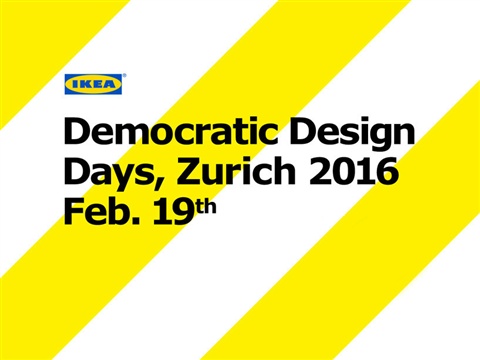
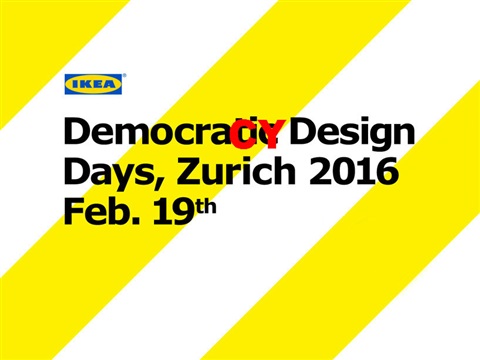
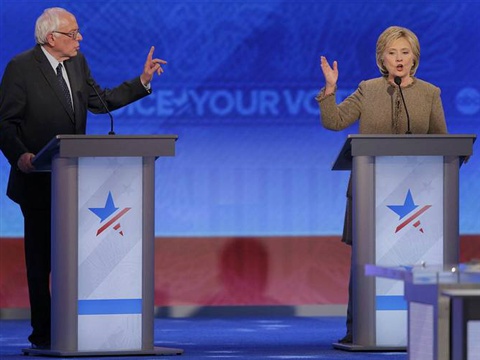



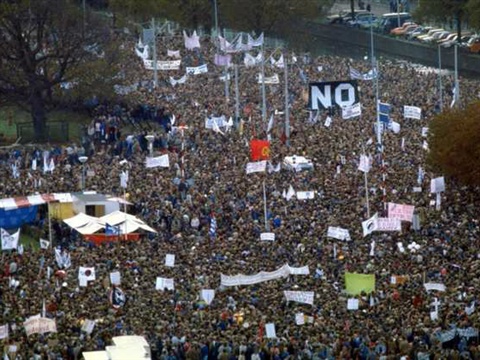
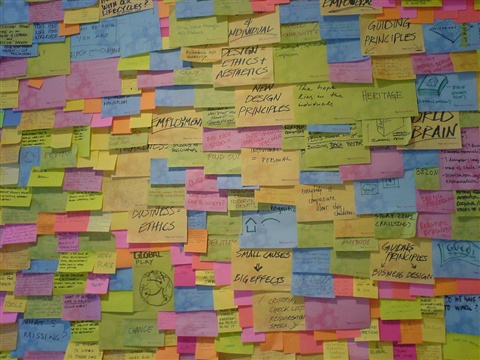





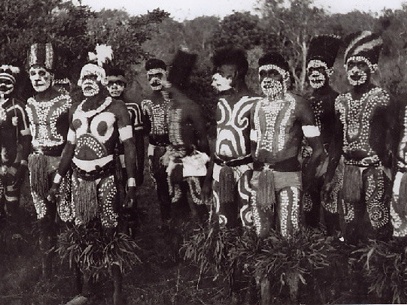

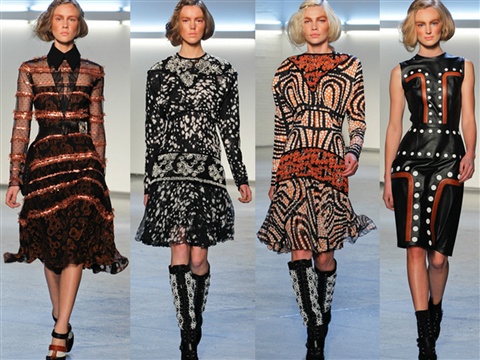
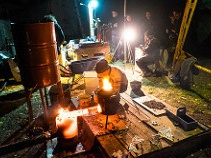


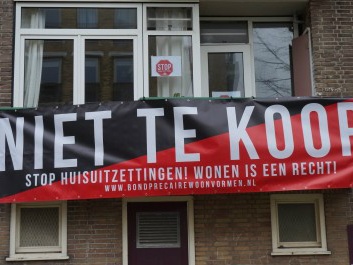

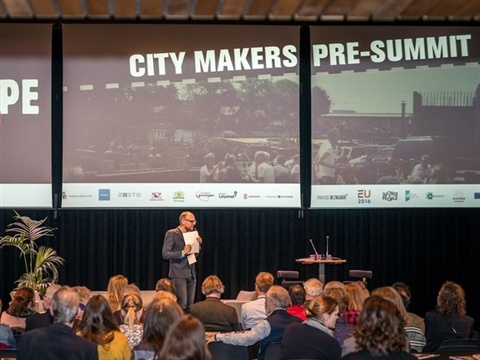
Meest recente reacties
ik zou graag illen weten wie de oudste geborernde in levenzijnde mogonees is
Dag Bart en Klaar!
Wij hebben jullie ontmoet bij de radio uitzending Kunst is Lang.
Ik vroeg me af hoe ik met jullie in contact kan komen in de toekomst! werkt het op deze manier? groet Eva
super trip for you , thank you beri beri much four sharing with us fans.....many greetings and best wishes to you and your loved ones...

Beste Bart en Klaar, Ik verblijf nu op Moengo en ik vroeg me af waar jullie je informatie over stafdorp en happyland etc vandaan hebben gehaald want daar zou ik graag nog meer over lezen! Alvast dank